Unit4
人教版高一英语 必修 4 Unit 4 reading 知识点总结(51张)
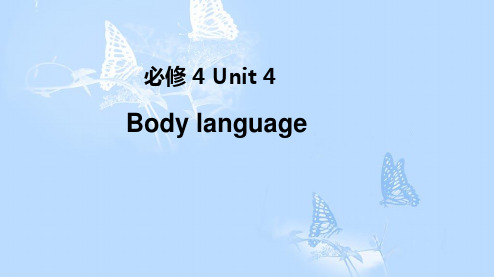
(2)representation n.
表现;描述,描绘
(3)representative n.
代表
adj. 典型的,有代表性的
[温馨提示] 同义词表示“代表”:on behalf of, stand for。
【活学活用】 (1)The museum had several paintings representing the artist's early style. 博物馆藏有几幅代表这个艺术家早期风格的油画。 (2)The chairman represented the importance of the bill to the audience. 主席向听众说后置定语 ___T__h_e__fi_r_s_t_p_e_r_s_o_n__t_o_a_r_r_i_v_e___ (第一个到达的人) was Tony Garcia from Colombia, closely followed by Julia Smith from Britain. 2.not all…表示部分否定,意为“并非所有的” ___N__o_t_a_l_l_c_u_l_t_u_r_e_s_g_r_e_e_t__e_a_c_h__o_th__e_r_t_h_e__sa__m_e__w__a_y____ (各种文化背景下的人互致问候的方 式不尽相同), nor are they comfortable in the same way with touching or distance between people.
(3)语法填空。 ①The subject is so difficult;I really don't know how to represent it___t_o___ you. ②The study was carried out in one small town, so we couldn‘t be sure that the results were truly _r_e_p_r_e_s_e_n_t_a_t_iv_e___(represent). ③The competition attracted over 500 players___r_e_p_r_e_s_e_n_t_i_n_g____ (represent) eight different countries.
英语读写教程-Unit-4-词汇详解
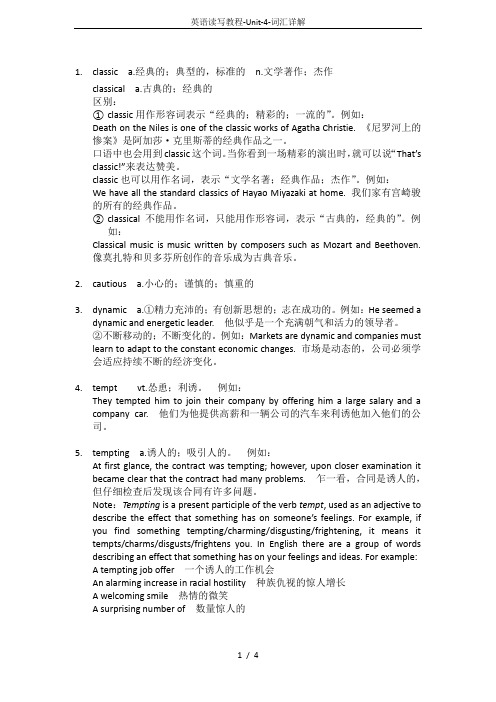
1.classic a.经典的;典型的,标准的n.文学著作;杰作classical a.古典的;经典的区别:①classic用作形容词表示“经典的;精彩的;一流的”。
例如:Death on the Niles is one of the classic works of Agatha Christie. 《尼罗河上的惨案》是阿加莎·克里斯蒂的经典作品之一。
口语中也会用到classic这个词。
当你看到一场精彩的演出时,就可以说“That’s classic!”来表达赞美。
classic也可以用作名词,表示“文学名著;经典作品;杰作”。
例如:We have all the standard classics of Hayao Miyazaki at home. 我们家有宫崎骏的所有的经典作品。
②classical不能用作名词,只能用作形容词,表示“古典的,经典的”。
例如:Classical music is music written by composers such as Mozart and Beethoven.像莫扎特和贝多芬所创作的音乐成为古典音乐。
2.cautious a.小心的;谨慎的;慎重的3.dynamic a.①精力充沛的;有创新思想的;志在成功的。
例如:He seemed adynamic and energetic leader. 他似乎是一个充满朝气和活力的领导者。
②不断移动的;不断变化的。
例如:Markets are dynamic and companies mustlearn to adapt to the constant economic changes. 市场是动态的,公司必须学会适应持续不断的经济变化。
4.tempt vt.怂恿;利诱。
例如:They tempted him to join their company by offering him a large salary and a company car. 他们为他提供高薪和一辆公司的汽车来利诱他加入他们的公司。
Unit 4 知识点提要

8A Unit 4 知识点提要一、词汇1.指示可n. instruction (an/-s) 常用复数★清晰的指示8AU3clear instructions2.工具n. tool (a/-s)3.刷子;画笔n. *brush ▲(a/-es)刷v. brush →▲三单:-es →过去式:-ed →现分:-ing4.胶水不可n. glue5.绳索可n. rope (a/-s)6.剪刀[复] scissors★一把剪刀 a pair of scissors[典型例题]( ).This pair of scissors ____ good. I don’t want ____.A.are; itB.isn’t; themC.isn’t; itD.aren’t; them7.磁带;胶带;修正带可n. tape (a/-s)8.自己动手做不可n. DIY ★(Do It Yourself)★一份自己动手做的工作 a DIY job9.确切地,精确地adv. exactly 比较级:more ~ 最高级:the most ~★DIY确切地说是什么?What’s DIY exactly?★(答语)正是,没错Exactly. ★(答语)并不是,不全是Not exactly.精确的adj. exact10.代表;象征(短语)stand for11.修补,修理v. repair★(fix) →三单:-s →过去式:-ed →现分:-ing★修理电脑repair a computer/computers ★修理自行车fix a bicycle/bicycles12.装饰v. *decorate →三单:-s →▲过去式:-d →▲现分:decorating13.反而,却adv. instead14.而不是,代替(短语)instead of考点1:★Instead+逗号→“恰恰相反的是,”★instead+句号→“代替”考点2:★instead of+V-ing、代词、名词→“而不是”/“代替”[典型例题]( )1. She didn’t throw away her old clothes. _______, she made some useful things with them.A.UnluckilyB. SuddenlyC. SeldomD. Instead( )2. There is little juice there in the fridge, if you are thirsty, you can drink some water _______.A.of insteadB. butC. instead ofD. instead( )3. Instead of ________ letters on paper, people communicate(交流) by sending e-mails.A.writing B.writes C.to write D.written( )4.—I don’t think their going swimming ____ telling adults(大人) is a good idea.—But things are now better ____ worse. They’ll let their parents know before going next time.A. instead of; withoutB. without; thanC. without; instead ofD. instead of; than( )5.—Excuse me, I want to know if my parents can collect the mail ________ me.—No. You must collect it ________. Remember: take your ID card with you.A.instead of;by oneself B.instead of; for oneself C.instead; by oneself D.instead; for oneself 15.玫瑰(花) 可n. rose (a/-s)制作一些纸玫瑰make some paper roses16.着迷的,狂热的;发疯的adj. crazy ▲比较级:crazier ▲最高级:the craziest17.对某物/做某事着迷be crazy about (doing) sth. (like something very much)18.可怕的adj. terrible (very bad)比较级:more ~ 最高级:the most ~★看起来可怕look terrible★非常,很adv. terribly19.曾经,一度;一次;一旦adv. once★立刻,马上at once= right away8AU5= right now= *immediately20.剪出(短语)cut out v. cut →三单:-s →▲过去式:cut →现分:cutting21.安装(短语)★★put in v. put →三单:-s →▲过去式:put →现分:putting[拓展] 扑灭put out 收拾put away 穿上put on推迟put off★组装put together①搭,树立;②★★张贴;③挂起↑put up22.错误,失误可n. mistake (a/-s)误解,误会v. mistake →三单:-s →▲过去式:mistook →▲现分:mistaking23.犯错误(短语)(2种)★make a mistake= make mistakes24.剪下,切下,割下v. cut →三单:-s →▲过去式:cut →▲现分:cutting25.供电中断;停电(短语)*power cut26.管子,水管;管乐器;烟斗可n. *pipe (a/-s)敲裂了水管hit a pipe27.使充满v. fill (make something full of something else)→三单:-s →过去式:-ed →现分:-ing28.用B填充A(短语)★fill A with B★充满... be filled with...= be full of...29.不仅A而且B(短语)not only A but (also) B★both A and B“A和B都”谓v.的数取决于A和B★not only A but (also) B“不仅A而且B”谓v.的数取决于B,即就近原则[典型例题]1.Both the twins and Jack _______(be) from the UK.2.Not only the twins but also Jack _______(be) from the UK.( )3.—______ some paper ______ a pair of scissors is needed to make paper roses.—I’ll get them right away.A.Not only; but alsoB. Both; andC. Either; orD. Neither; nor( )4.—______ some paper ______ a pair of scissors are needed to make paper roses.—I’ll get them right away.A. Not only; but alsoB. Both; andC. Either; orD. Neither; nor30.天花板可n. *ceiling (a/-s)31.(橱柜或书架等的)架子,隔板可n. *shelf ▲(a/shelves)32.哎呀感叹词. *whoops33.建议,忠告,劝告v. advise (tell someone what you think he/she should do)→三单:-s →▲过去式:-d →▲现分:advising建议做某事advise doing sth. ★建议某人(不要)做某事advise sb. (not) to do sth.建议,忠告,劝告不可n.8BU4advice ★一些建议some advice[典型例题]( )1.—I have a fever and I feel terrible. —I advise you ________ the doctor right now.A.see B.Seeing C.to see D.saw( )2.Usually I don’t advise ______ during a trip, but this time I think I should advise all of you _____ for a rest.A.to stop; to stopB.stopping; stoppingC.to stop; stoppingD.stopping; to stop( )3.—You’d better advise him ________ anything out of the window while driving.—I will. He has to know it’s dangerous.A.not throwing B.no throwing C.not to throw D.don’t throw4.Could you advise the little boy _______________ (not swim) in the lake?5.Listen carefully! The police _________ (advise) us how to cross the roads safely.34.可n. course (a/-s)★学习不同的课程take/attend different courses35. already36.经常去;出席v. attend (go to)→三单:-s →过去式:-ed →现分:-ing★上学attend school★参加会议(2种) attend a meeting/meetings (注意attend和join/ join in/ take part in区分)★上课(3种) attend a course/courses、attend a lesson/lessons、attend a class/classes37.句子可n. sentence (a/-s)★用新单词造句make sentences with the new words38.葡萄可n. grape (a/-s)39.草莓可n. strawberry ▲(a/strawberries)40.匙,调羹可n. spoon (a/s)41.沙拉可n.&不可n. salad (a/-s)★尝试使你的水果沙拉看起来和尝起来一样好try to make your fruit salad look as good as it tastes42.奶油;乳脂;霜不可n. *cream43.混合v. mix →▲三单:-es →过去式:-ed →现分:-ing把A与B混合mix A with B ★把它们混合在一起8AU4mix them together男女混合的,混合的adj.8AU2mixed ★一所混合学校 a mixed school44.增加,补充v. add →三单:-s →过去式:-ed →现分:-ing增加add to 把A添加到B里add A to B 总计为... add up to...45.提示,指点可n. *tip (a/-s)★制作水果沙拉的提示tips for making a fruit salad46.例子;榜样可n. example ▲(an/-s)47.例如(短语)(2种)for example★用于举例的3者之区别:For example+逗号= such as / like(像)不+逗号[典型例题]( )1. There are many good ways to save water. _______, turn off the tap when brushing teeth.A. Such asB.At firstC.HoweverD.For example( )2.There are many tools ________ brushes, tape, glue for you to ________ in the shop.A.for example, choose B.like, choose from C.such as, choose D.for example, choose from ( )3.Dandong is famous ______ its places of interest, ______ the Yalu River and the Hushan Great Wall.A.for; such as B.as; for example C.to; such as D.in; for example48.v. leave →三单:-s →▲过去式:left →现分:leaving①使处于某种状态★使某人/某物处于某种状态leave/keep sb./sth.+adj./doing★把它放在空气中一段时间8AU4leave it in the air for some time★使某人独处(3种)leave sb. alone /by oneself/ on one’s own②离开离开公园8AU4leave the park 离开A地去B地leave A for B动身去某地leave for+地点③忘★把某物忘在某地leave sth.+地点④留下留口信leave a message[典型例题]1.Don’t leave her ________ (wait) outside in the rain.2. It seems that it is going rain. You’d better ________ the windows ________ when you leave the house.A.leave; open B.not leave; opened C.not to leave; not open D.not leave; open49.调味汁,酱不可n. *sauce50.火腿可n. *ham (a/-s)51.正确的adj.&改正;批改v. correct= right= true不正确的adj.incorrect= wrong 正确地adv. correctly52.错误地,不对adv. wrong53.弄错;犯错;(机器)出故障(短语)go wrong54.完成的adj. finished完成;结束v.8AU2finish →▲三单:-es →过去式:-ed →现分:-ing55.完成v.&完全的,彻底的;全部的,整个的adj. complete =finish8AU2→三单:-s →▲过去式:completed →现分:-ing★完成做某事complete/finish doing sth.不完整的adj. in complete完全地;彻底地adv. completely56.确定的adj. certain不确定的adj.un certain当然Certainly. =Sure. = Of course.57.积极的,活跃的;主动的adj. active★一个积极的学生an active student不积极/不活跃/不主动的adj. inactive积极地adv. actively58.可能的adj. possible不可能的adj.im possible★尽可能adj./adv.as adj./adv. as possible= as adj./adv. as sb. can/could可能地adv. possibly59.收拾,整理v. tidy →▲三单:tidies →▲过去式:tidied →▲现分:tiding爱整洁的,整洁的adj.8AU1tidy ▲比较级:tidier ▲最高级:the tidiest不整洁的adj.un tidy60.收拾妥,整理好(短语)tidy up整理好你的卧室tidy up your bedroom ★整理好它tidy it up[典型例题]( ).You bedroom looks . Please .A.untidily; tidy it up B.untidy; tidy it up C.untidily, tidy up it D.untidy, tidy up it 61.秘密的adj. secret秘密可n.8AU1 secret (a/-s) ...的秘密the secret of...62.保密(短语)keep it secret区分:(为某人)保守秘密(短语)8AU1(2种)keep a secret (for sb.) =keep secrets (for sb.)某人自守秘密(不将秘密说出去) keep secrets to oneself对某人隐瞒keep secrets from sb.63.拼写v. spell →三单:-s →▲过去式:spelled/spelt →现分:-ing★一直拼错这些单词keep spelling the words wrong拼法可n.(a/-s)&拼写不可n. spelling64.气球可n. balloon (a/-s)65.粘住,钉住v. stick→三单:-s →★过去式:stuck [区分:卡车可n. <美> truck (a/-s)] →现分:-ing棍,棒可n. stick (a/-s)区分:票,入场券可n. ticket (a/-s)66.封面;盖子,罩&庇护所8AU6可n. cover (a/-s)★把它粘在封面上stick it on the cover不要以貌取人。
新教材译林版Unit 4知识汇总

Unit 4知识汇总一、语音Ff / f /five father family afternoon football breakfast fly funnyFather has five footballs for his five funny boys.爸爸有五个足球给他的五个有趣的男孩。
二、词汇三会:well 好can't=cannot yeah 是的,对的tweet(小鸟的)叽喳声quack (鸭子的)呱呱声ouch 哎呦fly 飞sad 难过的,伤心的either 也(用于否定句末尾)四会:basketball 篮球football 足球jump 跳skate 溜冰swim 游泳词组:1.play basketball 打篮球2. very well 非常好2.have a try 试一试 4. play football 踢足球3.look at me 看看我 6. Don't be sad. 不要伤心。
7.five funny boys 五个有趣的男孩8. five footballs 五个足球9. my name我的名字10. eleven years old 11岁11. What about...?……怎么样?12. what about=how about怎么样三、句型1. I can play basketball. 我会打篮球。
I can’t play basketball. 我不会打篮球。
2. Can you play basketball? Yes, I can./ No, I can't.你会打篮球吗?是的,我会。
/不,我不会。
3. Can Mike play basketball? Yes, he can.迈克会打篮球吗?是的,他会。
4.-Can you play basketball, Mike? -Yes, I can./ No, I can’t.你会打篮球吗,迈克?是的,我会。
高一英语(牛津)-Unit4-知识点梳理
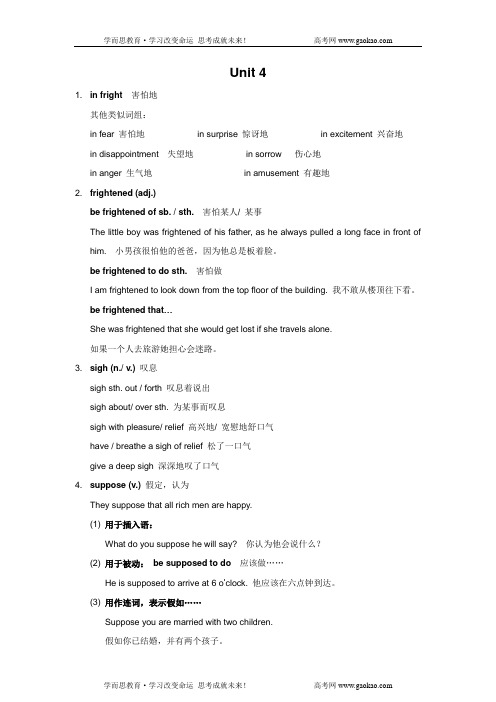
Unit 41. in fright 害怕地其他类似词组:in fear 害怕地in surprise 惊讶地in excitement 兴奋地in disappointment 失望地in sorrow 伤心地in anger 生气地in amusement 有趣地2. frightened(adj.)be frightened of sb. / sth.害怕某人/ 某事The little boy was frightened of his father, as he always pulled a long face in front of him. 小男孩很怕他的爸爸,因为他总是板着脸。
be frightened to do sth. 害怕做I am frightened to look down from the top floor of the building. 我不敢从楼顶往下看。
be frightened that…She was frightened that she would get lost if she travels alone.如果一个人去旅游她担心会迷路。
3. sigh (n./ v.) 叹息sigh sth. out / forth 叹息着说出sigh about/ over sth. 为某事而叹息sigh with pleasure/ relief 高兴地/ 宽慰地舒口气have / breathe a sigh of relief 松了一口气give a deep sigh 深深地叹了口气4. suppose (v.) 假定,认为They suppose that all rich men are happy.(1) 用于插入语:What do you suppose he will say? 你认为他会说什么?(2) 用于被动:be supposed to do 应该做……He is supposed to arrive at 6 o’clock. 他应该在六点钟到达。
人教版九年级Unit 4短语
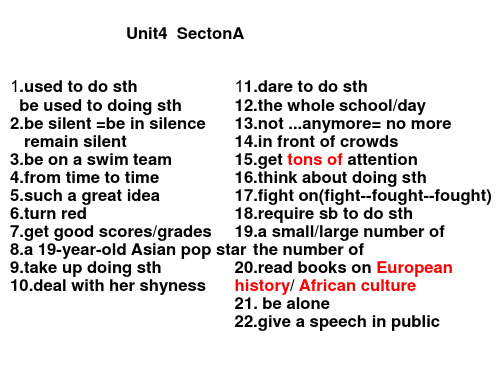
10.deal with her shyness history/ African culture
21. be alone
22.give a speech in public
Unit4 SectonA
1. 过去经常做某事
11.害怕做某事
习惯于做某事
12.整个学校
2.是沉默的
13.不再
3.在游泳队
14.在人群前
6.turn red
18.require sb to do sth
7.get good scores/grades 19.a small/large number of
8.a 19-year-old Asian pop star the number of
9.take up doing sth
20.read books on European
1.have difficulties /problems/trouble(in) doing 2.seldom cause any problems 3.feel lonely and unhappy 4.influnence sb. v.
have an influence on sb. n. 5.become less interested in 6.be absent from classes 7.make a decision to do sth.
But now he can get on well with other students. He takes an active part in all kinds of activities. He forms(养成) a healthy living habit. He always listens to the teachers carefully in class and finishes his homework on time. And he does well in all subjects and he can get good scores.
必修四Unit4知识点
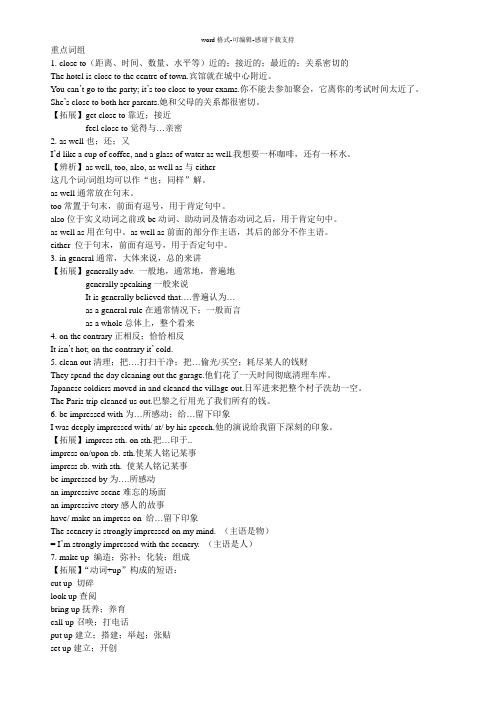
1. close to(距离、时间、数量、水平等)近的;接近的;最近的;关系密切的The hotel is close to the centre of town.宾馆就在城中心附近。
You can’t go to the party; it’s too close to your exams.你不能去参加聚会,它离你的考试时间太近了。
She’s close to both her parents.她和父母的关系都很密切。
【拓展】get close to靠近;接近feel close to觉得与…亲密2. as well也;还;又I’d like a cup of coffee, and a glass of water as well.我想要一杯咖啡,还有一杯水。
【辨析】as well, too, also, as well as与either这几个词/词组均可以作“也;同样”解。
as well通常放在句末。
too常置于句末,前面有逗号,用于肯定句中。
also位于实义动词之前或be动词、助动词及情态动词之后,用于肯定句中。
as well as用在句中。
as well as前面的部分作主语,其后的部分不作主语。
either 位于句末,前面有逗号,用于否定句中。
3. in general通常,大体来说,总的来讲【拓展】generally adv. 一般地,通常地,普遍地generally speaking一般来说It is generally believed that….普遍认为…as a general rule在通常情况下;一般而言as a whole总体上,整个看来4. on the contrary正相反;恰恰相反It isn’t hot; on the contrary it’ cold.5. clean out清理;把….打扫干净;把…偷光/买空;耗尽某人的钱财They spend the day cleaning out the garage.他们花了一天时间彻底清理车库。
英语人教版九年级全册Unit 4
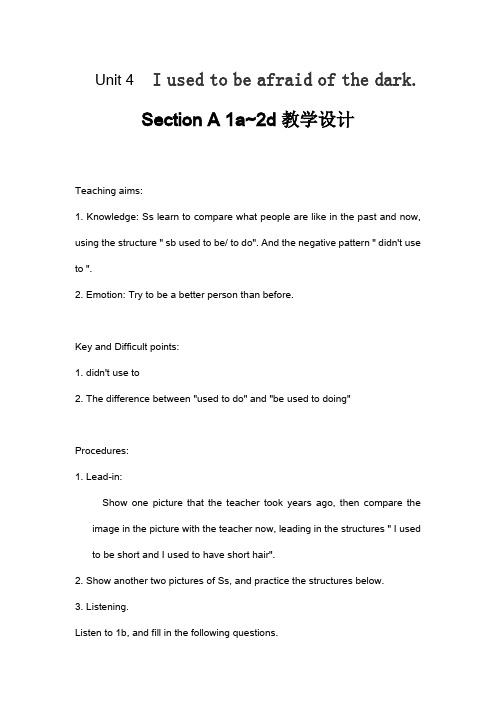
Unit 4I used to be afraid of the dark.Section A 1a~2d教学设计Teaching aims:1. Knowledge: Ss learn to compare what people are like in the past and now, using the structure " sb used to be/ to do". And the negative pattern " didn't use to ".2. Emotion: Try to be a better person than before.Key and Difficult points:1. didn't use to2. The difference between "used to do" and "be used to doing"Procedures:1. Lead-in:Show one picture that the teacher took years ago, then compare the image in the picture with the teacher now, leading in the structures " I used to be short and I used to have short hair".2. Show another two pictures of Ss, and practice the structures below.3. Listening.Listen to 1b, and fill in the following questions.a. Mario used to be ______ . He used to wear _______.b. Amy used to be ______. She used to have _____ hair.c. Tina used to have _____ and _____ hair.4. Read after the tape and imitate the tones and pronunciations.5. Listen to 2a and check the words you hear.______ friendly ______ outgoing ______ serious______ humorous ______ silent ______active_____ brave ______ quiet ______ helpful6. Listen again and complete the blanks about how Paula has changed.a. Paula used to be really ______ . She was always silent in class. She wasn'tvery ______. She was never brave enough to ask questions. But now she's more interested in ______. She plays ______ almost every day. She's also on a ______ team.b. She got good grades in ______. She was also good in ______. She used toplay the piano. And now she still plays the ______ from time to time.7. Skim. Read and answer the following questions.a. When did they see each other for the last time?b. What was Billy like in the past?8. Role-play the conversation in pairs or groups.Exercises:1. I used to like pop music. (改为一般疑问句)______ you ______ to like pop music.2. You used to be silent. (完成附加问句)You used to be silent, ______ ______?3. There was a school in this village before. (改为同义句)There ______ ______ ______ a school in this village.4. She used to be humorous.(对划线部分提问)______ ______ she use to ______?5. My grandfather used to take a walk after dinner.(对划线部分提问) ______ ______ your grandfather use to ______ after dinner?。
高中英语人教版-必修一Unit 4词汇表

必修一U n i t4词汇表e a r t h q u a k e['ə:θk w e i k]n.地震q u a k e[k w e i k]n.地震r i g h t a w a y立刻;马上w e l l[w e l]n.井∆c r a c k[k ræk]n.裂缝;噼啪声v t.&v i.(使)开裂;破裂∆s me l l y['s m e l i]a d j.发臭的;有臭味的∆f a r m y a r d['fɑ:m jɑ:d]n.农场;农家p i p e[p a i p]n.管;导管b u r s t[bə:s t]v i.爆裂;爆发n.突然破裂;爆发m i l l i o n['m i l jən]n.百万e v e n t[i'v e n t]n.事件;大事a s i f仿佛;好像a t a n e n d结束;终结n a t i o n['n e iʃən]n.民族;国家;国民c a n a l[kə'næl]n.运河;水道s t e a m[s t i:m]n.蒸汽;水汽d i r t[də:t]n.污垢;泥土r u i n['r u i n,'r u:-]n.废墟;毁灭v t.毁灭;使破产i n r u i n s严重受损;破败不堪s u f f e r i n g['sʌfər iŋ]n.苦难;痛苦e x t r e m e[i k's t r i:m]a d j.极度的i n j u r e['i n dʒə]v t.损害;伤害∆s u r v i v o r[sə'v a i və]n.幸存者;生还者;残存物d e s t r o y[d i's t rɔi]v t.破坏;毁坏;消灭b r ic k[b r i k]n.砖;砖块d a m[dæm]n.水坝;堰堤t r a c k[t ræk]n.轨道;足迹;痕迹u s e l e s s['j u:s l i s]a d j.无用的;无效的;无益的s h o c k[ʃɔk]v t.&v i.(使)震惊;震动n.休克;打击;震惊r e s c u e['r e s k j u:]n.&v t.援救;营救t r a p[t ræp]v t.使陷入困境n.陷阱;困境e l e c t r i c i t y[,i l e k't r i sət i]n.电;电流;电学d i s a s te r[,d i'zɑ:s tə]n.灾难;灾祸d i g o u t掘出;发现b u r y['b e r i]v t.埋葬;掩埋;隐藏m i n e[m a i n]n.矿;矿山;矿井m i n e r['m a i nə]n.矿工s h e l t e r['ʃe l tə]n.掩蔽;掩蔽处;避身处a(g r e a t)n u mb e r o f许多;大量的t i t l e['t a i t l]n.标题;头衔;资格r e p o r t e r[r i'pɔ:tə]n.记者b a r[bɑ:]n.条;棒;条状物d a m a g e['dæm i dʒ]n.&v t.损失;损害f r igh t e n['f r ai tən]v t.使惊吓;吓唬f r igh t e n e d['f r ai t n d]a d j.受惊的;受恐吓的f r igh t e ni n g['f r a i tən iŋ]a d j.令人恐惧的c o n g r a t u l a t i o n[kən,ɡrætʃu'l e iʃən]n.祝贺;(复数)贺词j u d g e[dʒʌdʒ]n.裁判员;法官v t.断定;判断;判决s i n c e r e l y[s i n's iəl i]a d v.真诚地;真挚地e x p r e s s[i k's p r e s]v t.表示;表达n.快车;速递o u t l i n e['a u t l a i n]n.要点;大纲;轮廓h e a d l i n e['h e d l a i n]n.报刊的大字标题c y c l i s t['s a i k l i s t]n.骑必修一U n i t5词汇表∆N e l s o n M a n d e l a['n e l s n mæn'd e lə]纳尔逊∙曼德拉(前南非共和国总统)q u a l i t y['k wɔlət i]n.质量;品质;性质∆w a r m-h e a r t e d[,wɔ:m'h a:t i d]a d j.热心肠的m e a n[mi:n]a d j.吝啬的;自私的;卑鄙的a c t i v e['æk t i v]a d j.积极的;活跃的g e n e r o u s['dʒe nərəs]a d j.慷慨的;大方的∆e a s y-g o i n g[,i:z i:'gəu iŋ]a d j.随和的;温和宽容的s e l f[s e l f]n.自我;自身s e l f i s h['s e l f iʃ]a d j.自私的s e l f l e s s['s e l f l i s]a d j.无私的;忘我的s e l f l e s s l y['s e l f l i s l i]a d v.无私地;忘我地d e v o t e[d i'vəu t]v t.(与t o连用)献身;专心于d e v o t e d[d i'vəu t i d]a d j.忠实的;深爱的∆Wi l l i a m T y n d a l e['w i l jəm't i n d l]威廉∙廷代尔(英国早期新教改革者)∆B i b l e['b a i b l]n.《圣经》∆N o r ma n B e t h u n e['Nɔ:mən bə'θj u:n]诺曼∙白求恩(加拿大胸外科医师)∆i n v a d e r[i n'v e i də]n.侵略者f o u n d[f a u n d]v t.建立;建设r e p u b l i c[r i'pʌb l i k]n.共和国;共和政体p r i n c i p l e['p r i n səp l]n.法则;原则;原理∆n a t i o n a l i s m['næʃənəl i zəm]n.民族主义;国家主义∆l i v e l i h o o d['l a i v l i h u d]n.生计;谋生∆M o h a n d a s G a n d h i[məu'hæn dəs'gæn d i]莫罕达斯∙甘地(印度国民大会党领袖)p e a c e f u l['p i:s f u l]a d j.和平的;平静的;安宁的∆g i a n t['dʒa iən t]a d j.巨大的;庞大的∆l e a p[l i:p]n.飞跃;跳跃ma n k i n d[,mæn'k a i n d]n.人类∆E l i a s[i'l a iəs]伊莱亚斯(男名)l a w y e r['lɔ:jə]n.律师g u i d a n c e['ɡa i dən s]n.指导;领导l e g a l['l i:ɡəl]a d j.法律的;依照法律的f e e[f i:]n.费(会费;学费等);酬金∆p a s s b o o k['pɑ:s b u k]n.南非共和国有色人种的身份证∆J o h a n n e s b u r g[dʒəu'hæn i s bə:g]约翰内斯堡(南非城市)o u t o f w o r k失业h o p e f u l['həu p f u l]a d j.有希望的∆A N C非国大;非洲人国民大会;非洲民族会议y o u t h[j u:θ]n.青年;青年时期l e a g u e[l i:ɡ]n.同盟;联盟;联合会Y o u t h L e a g u e青年团s t a g e[s t e i dʒ]n.舞台;阶段;时期v o t e[vəu t]v t.&v i.投票;选举n.投票;选票;表决a t t a c k[ə'tæk]v t.进攻;攻击;抨击v i o l e n c e['v a iələn s]n.暴力;暴行a s a ma t t e r o f f a c t事实上b l o wu p使充气;爆炸e q u a l['i:k wəl]a d j.相等的;平等的i n t r o u b l e在危险;受罚;痛苦;忧虑等的处境中w i l l i n g['w i l iŋ]a d j.乐意的;自愿的u n f a i r[,ʌn'fεə]a d j.不公正的;不公平的t u r n t o求助于;致力于∆q u o t e[k wəu t,kəu t]n.引用语;语录∆r e l e a s e[r i'l i:s]v t.释放;发行l o s e h e a r t丧失勇气或信心∆R o b b e n I s l a n d[lɔbən'a i lən d]罗本岛e s c a p e[i's k e i p]v i.逃脱;逃走;泄露b l a n k e t['b læŋk i t]n.毛毯;毯子e d u c a t e['e d j u:k e i t]v t.教育;训练e d u c a t e d['e d j u:k e i t i d]a d j.受过教育的;有教养的c o me t o p o w e r当权;上台b e g[b eɡ]v i.请求;乞求r e l a t i v e['r e lət i v]n.亲戚;亲属t e r r o r['t e rə]n.恐怖;可怕的人;恐怖时期;恐怖活动c r u e l t y['k r u:əl t i]n.残忍;残酷r e w a r d[r i'wɔ:d]n.报酬;奖金v t.酬劳;奖赏∆T r a n s k e i[t ræn s'k a i]特兰斯凯(南非东南部一地区)s e t u p设立;建立s e n t e n c e['s e n tən s]v t.判决;宣判b e s e n t e nc ed t o被判处……(徒刑)a n t i-['æn t i,-t a i][前缀]反;抗;阻a n t i-b l ac k['æn t i-b læk]ad j.反黑人的∆C a p e T o w n开普敦(南非立法首都)p r e s i d e n t['p r e z i dən t]n.总统;会长;校长;行长∆N o b e l P e a c e P r i z e[nəu'b e l'p i:s'p r a i z]诺贝尔和平奖。
Unit4
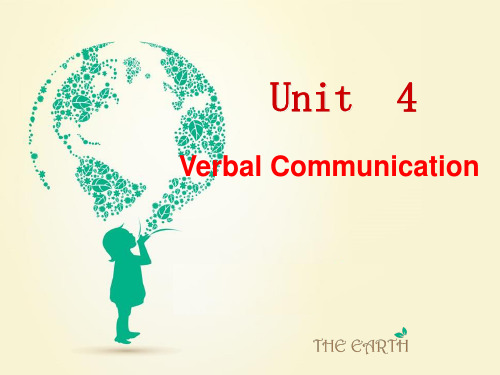
A new broom sweeps clean. Many hands make light work. Don’t put off until tomorrow what you
11
II. Detailed Study 1.Culturally Loaded Words
What is loaded words?
Loaded words and phrases are those which have strong emotional overtones (n. 暗示,弦外音,寓意 ) or connotations (n. 涵 义 , 言 外 之 意 ), and which evoke strongly positive or negative reactions beyond their literal meaning.
22
Things or concepts are represented by one or perhaps two terms in one language, but by many more terms in the other language, ie, finer distinctions exist in the other language;(社会科学)
In EC, it refers to people of high academic status (college professors) –much smaller range of people. not always a complimentary term, sometimes used in derogatory贬义的 sense.
七上英语unti4知识点

七上英语unti4知识点
Unit 4的知识点包括但不限于:
1. 词汇:包括名词(如backpack、book、pencil等)、形容词(如old、new、big等)、动词(如have、need、find等)和介词(如in、on、under等)。
2. 语法:一般现在时的使用,包括主语+动词原形的结构,以及疑问句和肯定句的变换。
指示代词this和that的使用也是重要的知识点。
3. 物品位置的描述:可以使用where引导的疑问句来询问物品的位置,以
及介词on表示物品在某物的上面。
4. 动词的用法:take表示从近处带到远处,而bring表示从远处带到近处。
5. some和any的使用:some一般用于肯定句,any用于否定句和疑问句。
在表示请求、建议、征求意见等委婉语气的疑问句中,用some而不用any。
6. 名词所有格:在英语中,表达“我的”、“你的”、“他的”时,可以使用代词my、your、his等。
7. 其他语法点:比如指示代词these和those的使用。
this用于指离说话
者近的人、物,that用于指离说话者远的人、物;同时,在表达“我的”、“你的”、“他的”时,也可以使用名词所有格形式,如my backpack、your book、his pencil等。
以上内容仅供参考,建议查阅七年级英语课本或咨询英语老师,获取更准确的信息。
_Unit 4 单词详解-21-22学年高中英语人教版(19)选择性必修第一册
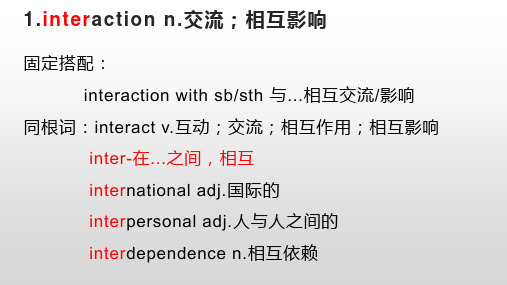
固定搭配: interaction with sb/sth 与...相互交流/影响
同根词:interact v.互动;交流;相互作用;相互影响 inter-在...之间,相互 international adj.国际的 interpersonal adj.人与人之间的 interdependence n.相互依赖
5.demonstrate vt表现;表达;说明;证明 demonstration n.表现;表达;说明;证明;示范;示威游行 demonstrator n.示威者
6/7. witness/employ P57 同步
8.identical adj.相同的;完全同样的 be identical to/with 与...相同 be identical in 在...相同
bare 光秃的;荒芜的;无遮盖的
bare 部分裸露
naked 一丝不挂
bald 头上无发,山坡无草,树顶无叶
barren 缺少肥力而无草木
27/28.occupy P30 同步 stare P64
29.distract vt.分散(注意力);使分心
distract sb/sth from sth 转移/分散...(对某事)的注意力 distracting adj.令人分心的 distracted adj.心烦意乱的;注意力分散的 distraction n.分散注意力;使人分心的事
17.incident 政治上的事变 accident 意外发生的不幸事件 event 历史上的重大事件
18. assess P.61 同步
19.internal adj.内部的;里面的 external adj.外部的;外面的
英语(二)-unit 4

新思路学校:教育部考试中心指定助学单位
咨询电话:400-800-2915
第三部分:作业讲解—文章1
p.168 Section B 选词填空
1. 答案:committed adj. be committed to doing sth. 尽心尽力做某事。 翻译:总统致力于改革医疗保健。 2. 答案:subsistence n. subsistence agriculture/ farming:收成仅够 口粮的生存农业。 翻译:大多数非洲黑人依靠生存农业过活。 3. 答案: immigrants n. 移民 【补充】 immigrate v.移民 翻译:许多学生都是第二代或者第三代移民后裔。 4. 答案:unrest n. 动荡,骚动。【补充】turmoil n. 混乱,动荡 翻译:饥饿问题加剧了这个国家的动荡局势 。
新思路学校:教育部考试中心指定助学单位 咨询电话:400-800-2915
第三部分:作业讲解—文章1
4. The rain will be a 【解析】blessing n.: 好事,有益之事;bless v. 祝福
5. Your suggestion will contribute to solving the problem. 你的建议 会是解决问题的原因之一。 【解析】contribute to sth./doing sth. 是……的原因之一。 6. It is illegal to buy cigarette in Britain if you are under 16. 在英国, 如果你未满16周岁,买烟是犯法行为。 【解析】it is illegal to do sth. 做某事违法;legal adj. 合法的
仁爱版七年级英语上册unit4知识点
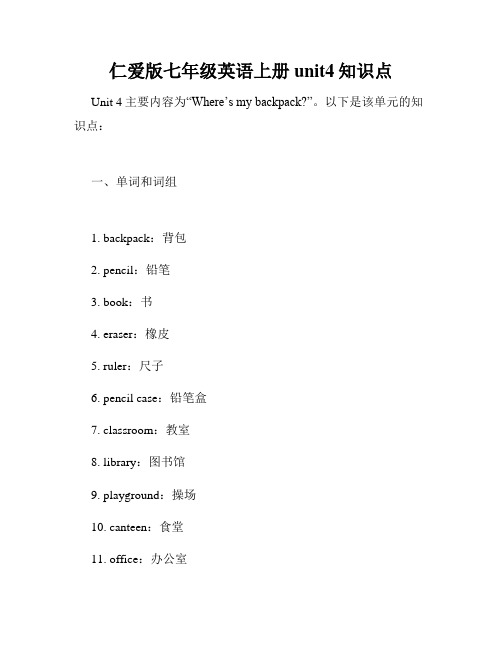
仁爱版七年级英语上册unit4知识点Unit 4主要内容为“Where’s my backpack?”。
以下是该单元的知识点:一、单词和词组1. backpack:背包2. pencil:铅笔3. book:书4. eraser:橡皮5. ruler:尺子6. pencil case:铅笔盒7. classroom:教室8. library:图书馆9. playground:操场10. canteen:食堂11. office:办公室12. restroom:卫生间13. go straight:直走14. turn left/right:向左/右拐15. on the left/right:在左/右边二、句型和语法1. Where’s my backpack?:我的背包在哪里?2. It’s in the classroom.:它在教室里。
3. Where’s my pencil case?:我的铅笔盒在哪里?4. It’s on the desk.:它在桌子上。
5. Where’s the restroom?:卫生间在哪里?6. It’s next to the library.:它在图书馆旁边。
7. Excuse me, where’s the canteen?:请问,食堂在哪里?8. Go straight and turn left.:直走然后向左拐。
9. Where’s the office?:办公室在哪里?10. It’s across from the restroom.:它在卫生间对面。
三、重点词汇解析1. classroom:教室- class:课程,班级- room:房间2. library:图书馆- libr:图书- -ary:表“地方”的后缀3. playground:操场- play:玩,游戏- ground:地面,场地4. canteen:食堂- can:罐头- teen:叫号后缀四、话题练习根据上述知识点,练习以下话题:A. 对话练习1. A: Excuse me, where’s the restroom? B: It’s next to the library.2. A: Where’s my backpack?B: It’s in the classroom.3. A: Where’s the office?B: It’s across from the restroom.4. A: Excuse me, where’s the canteen? B: Go straight and turn left.B. 句型转换1. I am next to the library.: Where am I?2. It’s in the pencil case.: Where’s the eraser?3. He’s in the classroom.: Where’s she?4. They’re on the playground.: Where are we?5. Go straight and turn right.: How can I get to the office?C. 阅读练习My ClassroomHi, my name is Lily. This is my classroom. The backpack is on the desk. The pencil case is under the chair. The book is on the shelf. The eraser is in the pencil case. The ruler is on the desk. I love my classroom.1. Who is talking about the classroom?2. Where is the backpack?3. Where’s the pencil case?4. Where’s the book?5. Is the eraser on the desk?总结:仁爱版七年级英语上册unit4知识点主要涉及单词和词组、句型和语法、重点词汇解析等方面。
新标准大学英语四UNIT4 ppt课件
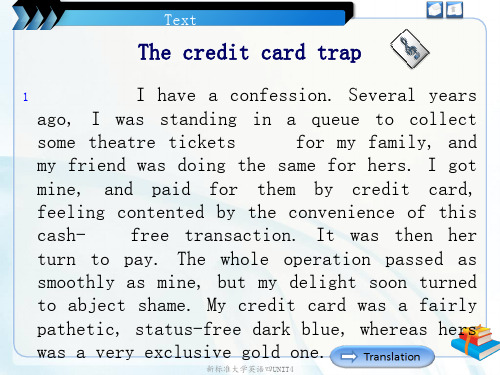
charge them more interest, and earn more
money. That's the way they do business.
新标准大学英语四UNIT4
Text
8
So does this explain why the credit
card companies are luring impoverished
新标准大学英语四UNIT4
Text
2
How did she do this? How
could this be? I knew I earned more than her,
my car was newer, and my house was smarter.
How did she get to appear more flash than me?
naturally her credi大学英语四UNIT4
Text
17
And not
surprisingly,
she couldn't
pay off
even
the minimum
payment on her credit
charardges obwilinlg., butSaolso credit card debts and interest.
then who didn't? I paid off all my credit
debt at the end of the month, so although
technically, I was in debt to the credit card
company, it was only for a matter of a few
Unit 4(全)
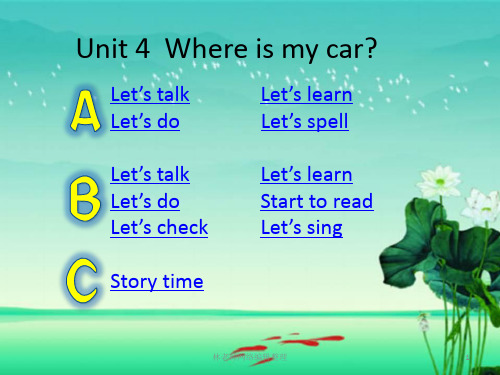
林老师网络编辑整理
13
发音小贴士
本课时我们学习的是元音字母o在单 词中发短元音/ ɔ /。发/ ɔ /时,口张 大,舌身尽量降低并后缩,双唇稍 稍收圆。
发音舌位图
林老师网络编辑整理
14
听录音,完成课本第40页的Read,
listen and number.
听力录音原文:
1.box
doll dog mom
型 2.—Is it in/on/under...?
—Yes,it is./No,it isn’t.
林老师网络编辑整理
27
Start to read
1.完成课本第43页的题目。看图,找 出Zip在哪儿。
2.核对答案。 3.听录音,读句子。 4.根据课本图片,选取一两个物体询
问其位置。
林老师网络编辑整理
28
Let’s check
(一)
1.完成课本第44页的Look and tick. 2.核对答案。
答案:□√ box □√ boat □√ pen
□√ cap □√ map
□√ห้องสมุดไป่ตู้car □√ ball
林老师网络编辑整理
29
(二)
1.打开课本第44页,仔细观察Listen and tick or cross.部分的四幅图片, 看看各物体的位置。
听录音,假装做出相应的动作。
林老师网络编辑整理
25
Unit 4 Where is my car?
林老师网络编辑整理
26
单元知识回顾
词 on,in,under,chair,desk,cap,ball, 汇 car,boat,map
1.—Where is...?
Unit 4 短语
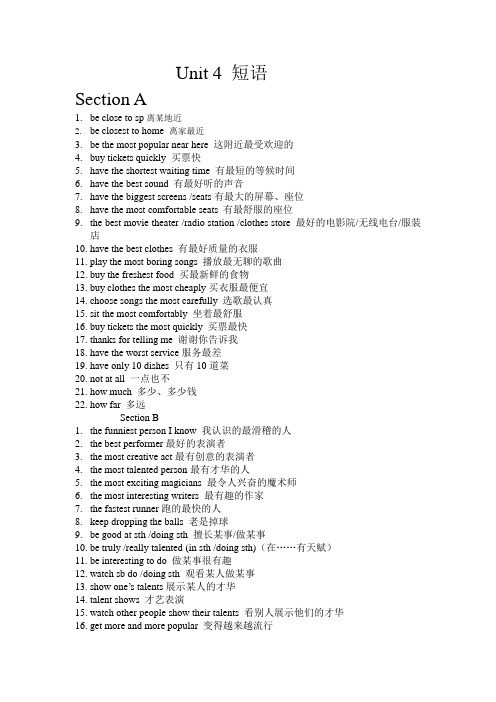
Unit 4 短语Section A1.be close to sp离某地近2.be closest to home 离家最近3.be the most popular near here 这附近最受欢迎的4.buy tickets quickly 买票快5.have the shortest waiting time 有最短的等候时间6.have the best sound 有最好听的声音7.have the biggest screens /seats有最大的屏幕、座位8.have the most comfortable seats 有最舒服的座位9.the best movie theater /radio station /clothes store 最好的电影院/无线电台/服装店10.have the best clothes 有最好质量的衣服11.play the most boring songs 播放最无聊的歌曲12.buy the freshest food 买最新鲜的食物13.buy clothes the most cheaply买衣服最便宜14.choose songs the most carefully 选歌最认真15.sit the most comfortably 坐着最舒服16.buy tickets the most quickly 买票最快17.thanks for telling me 谢谢你告诉我18.have the worst service服务最差19.have only 10 dishes 只有10道菜20.not at all 一点也不21.how much 多少、多少钱22.how far 多远Section B1.the funniest person I know 我认识的最滑稽的人2.the best performer最好的表演者3.the most creative act最有创意的表演者4.the most talented person最有才华的人5.the most exciting magicians 最令人兴奋的魔术师6.the most interesting writers 最有趣的作家7.the fastest runner跑的最快的人8.keep dropping the balls 老是掉球9.be good at sth /doing sth 擅长某事/做某事10.be truly /really talented (in sth /doing sth)(在……有天赋)11.be interesting to do 做某事很有趣12.watch sb do /doing sth 观看某人做某事13.show one’s talents展示某人的才华14.talent shows 才艺表演15.watch other people show their talents 看别人展示他们的才华16.get more and more popular 变得越来越流行17.there be 有18.similar shows 类似的节目19.around / all over the world全世界20.such as 例如,比如21.for example 例如22.have one thing in common 有一个共同点23.try to do sth 尽力做某事24.look for 寻找25.try to look for the best singers 尽力寻找最好的歌手26.and so on 如此等等27.all kinds of 各种各样的28.play the piano the best 弹钢琴弹得最好29.sing the most beautifully 唱得最动听30.be up to sb 由某人决定31.That’s up to you to decided. 那由你来决定。
Unit 4 课文文本和翻译-高中英语人教版(2019)选择性必修第一册
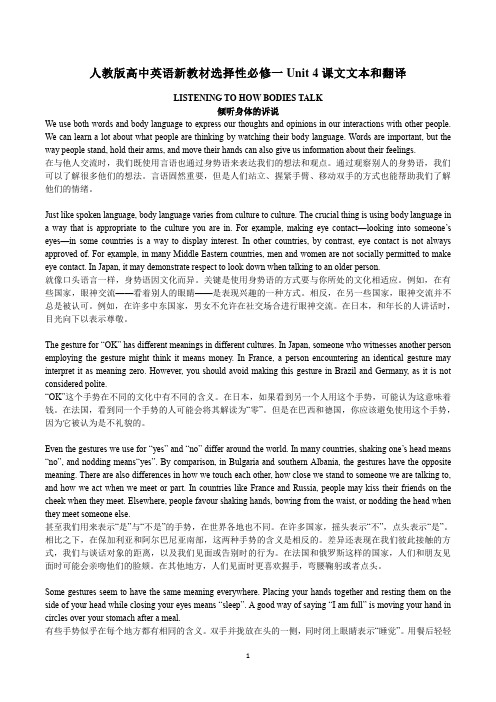
人教版高中英语新教材选择性必修一Unit 4课文文本和翻译LISTENING TO HOW BODIES TALK倾听身体的诉说We use both words and body language to express our thoughts and opinions in our interactions with other people. We can learn a lot about what people are thinking by watching their body language. Words are important, but the way people stand, hold their arms, and move their hands can also give us information about their feelings.在与他人交流时,我们既使用言语也通过身势语来表达我们的想法和观点。
通过观察别人的身势语,我们可以了解很多他们的想法。
言语固然重要,但是人们站立、握紧手臂、移动双手的方式也能帮助我们了解他们的情绪。
Just like spoken language, body language varies from culture to culture. The crucial thing is using body language in a way that is appropriate to the culture you are in. For example, making eye contact—looking into someone’s eyes—in some countries is a way to display interest. In other countries, by contrast, eye contact is not always approved of. For example, in many Middle Eastern countries, men and women are not socially permitted to make eye contact. In Japan, it may demonstrate respect to look down when talking to an older person.就像口头语言一样,身势语因文化而异。
- 1、下载文档前请自行甄别文档内容的完整性,平台不提供额外的编辑、内容补充、找答案等附加服务。
- 2、"仅部分预览"的文档,不可在线预览部分如存在完整性等问题,可反馈申请退款(可完整预览的文档不适用该条件!)。
- 3、如文档侵犯您的权益,请联系客服反馈,我们会尽快为您处理(人工客服工作时间:9:00-18:30)。
Book Three
Reading Preview
1. Which animals are common pets? 2. Which pets would you not like in your house? Say why. 3. Why do you think people keep pets?
Book Three
remarkable:
worth noticing or unusual; exceptional
Book Three
creature:
living being, esp. an animal
Book Three
permit:
to allow
Book Three
hide:
Book Three
folly:
foolishness; lack of wisdom
Book Three
abroad damage *circus missing bark identification tag in service *shelter owner *hamster
adv. vt. n. adj. vi. n. n.
Book Three
Just then the gardener’s little son happened by. “Mouse!” he exclaimed, “Aha, I know something much stronger than a mouse, I mean the cat who catches the mouse and eats him up.” At this Frank realized his folly. And from then on he called the animal by the most beautiful name—the name of Cat.
Book Three
Book Three
Book Three
Listen to the story and fill in the blanks with words you hear on the tape. traveling abroad in a small red A man was __________ car. One day he left the car and went _________. shopping When he came ________, its roof was badly back damaged. Some boys told him that an __________ elephant had damaged it. The man did not believe __________ them, but they took him to a circus which was near there.
Book Three
A
I have many pets at home. Every pet has his own favorite place. The monkey likes to stay on the bed. The dog likes to stand behind the sofa. The cat likes to sleep in the sofa. The rabbit likes to play with the turtle under the bed. The goldfish is always in the tank near the window. The parrot likes to sing for me in my hand. The hamster likes to walk on the coffee table.
Book Three
owner The __________ of the elephant said, “I am sorry very _______ ! My elephant has a big, round, chair red __________. He thought that your car was his chair, and he sat on it!” Then he gave letter the man a __________, in which he said that pay he was sorry and that he would __________ for all the damage.
Book Three
Байду номын сангаас
sound:
to give a specific impression when heard
Book Three
identification:
means of proving who one is; official papers that do this
Book Three
Book Three
The Cat and Its Six Names Frank had a pet cat, and he loved it very much. He was so proud of the cat and he thought it was such a remarkable creature that he decided to name it Sky. One day, a friend said to him, “Permit me to point out to you that there is something stronger than sky. I mean the clouds, for they hide the sky.” “You are right,” replied Frank, “and from now on, I’m going to give my most remarkable cat the name Cloud.”
Book Three
But a week had not passed when the mayor of the town, whom Frank had invited to his house, noticed this quite remarkable cat. “Wind?” he asked. “There is something stronger than the wind. I mean the wall that it cannot blow through.” “Ah, so,” said the owner of the cat, “my most beloved pet will be called Wall.” A little later, a scholar remarked to him, “There is something that can conquer even a wall—the mouse that nibbles a hole through it.” “That is true,” said Frank.“I will name my most remarkable cat Mouse.”
Book Three
Tom: Poor baby. Where did you come from? Sally: Look at the dog’s identification tag. It says her name is Gemma, and she belongs to Mr. and Mrs. Wilson. Tom: Is there a telephone number? Sally: Yes. It’s 66668558. Tom: Shall we call them, and tell the Wilsons that we’ve found their pet dog?
owner
person who possesses sth.
Book Three
Put the pictures at the correct places.
fish parrot dog monkey rabbit turtle cat hamster
Please refer to the textbook for pictures.
Book Three
Sally: OK. (several minutes later) The number is no longer in service. Tom: What shall we do then? Sally: Let’s take Gemma to the Animal Shelter. They’ll take good care of it, and find the owner.
Book Three
Sometime later, another friend was drinking tea at Frank’s house. “Why is it,” he asked, “that you call this most remarkable creature Cloud? For there is something much stronger than the clouds. I mean the wind, for it can blow the clouds away.” So from then on his master called the cat by the name of Wind.
Book Three
B
I have many pets in the garden. Just now the
dog is chasing the cat around the tree. The cat is chasing the hamster around the tree. The monkey is catching the goldfish from the tank. The parrot is singing in the tree. The rabbit is eating cabbage near the car. The turtle is walking on the path.
